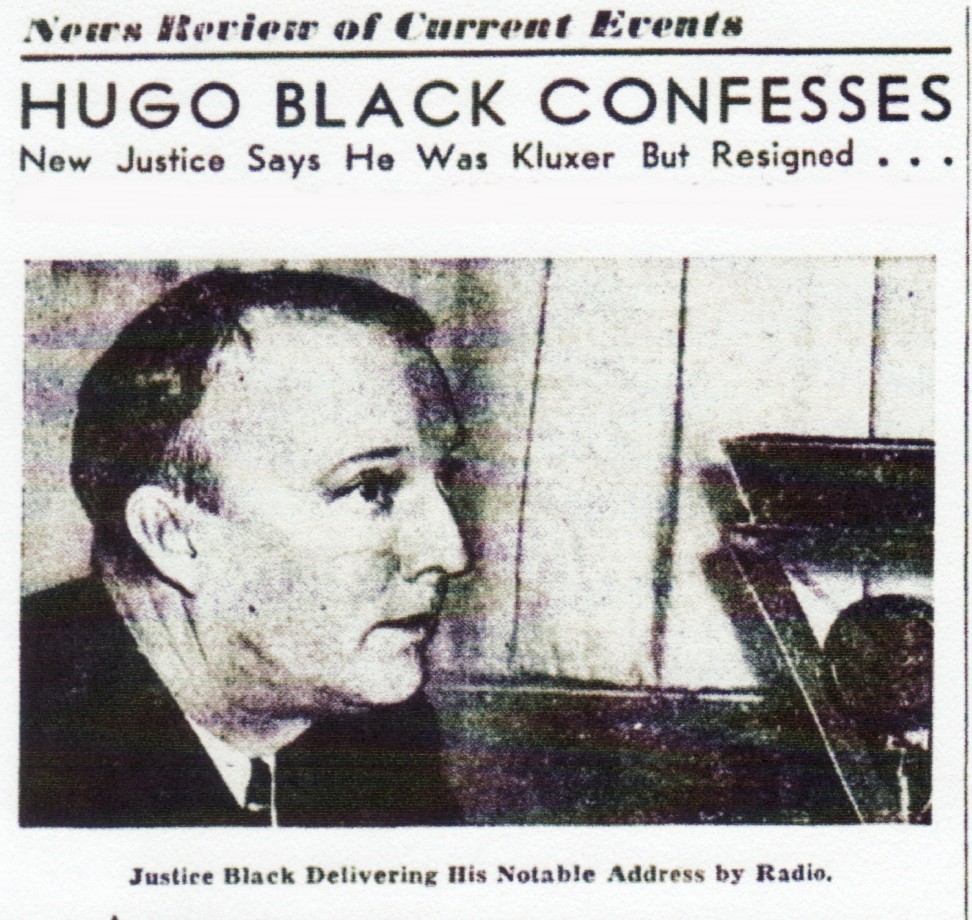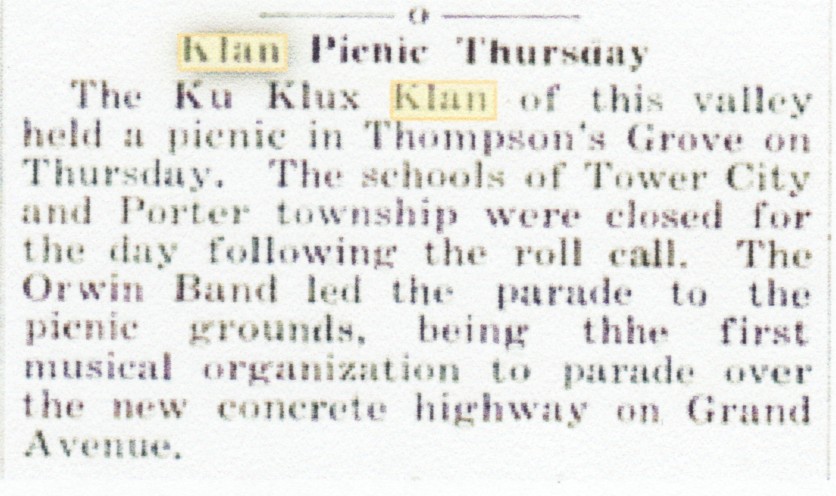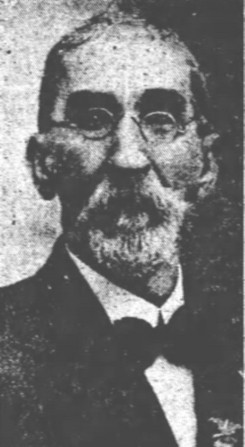Hugo Black Confesses to Ku Klux Klan Membership, 1937
Posted By Norman Gasbarro on May 9, 2018
The story of the the nomination and confirmation of Sen. Hugo L. Black, Alabama, to the U. S. Supreme Court in 1937, was widely reported in the national and local press. Black’s association with and membership in the Ku Klux Klan was of great concern to most Americans.
Three interesting articles appeared in the West Schuylkill Herald, Tower City, Schuylkill County, Pennsylvania. Given that the area of Tower City and the Lykens Valley were significant supporters of the Klan, particularly in the mid-1920s, the articles showed a change to a more neutral attitude toward the hate organization – but whether the Herald received any letters supporting or decrying the nomination is not known as no local opinion was presented on the subject.
This post is a continuation of the reporting on hate groups that were active in the Lykens Valley area in the years following the Civil War. It was a widely known fact that the Ku Klux Klan had a significant presence in the Lykens Valley and adjacent valleys during the early years of the 20th Century. This iteration of the Klan was strongly white supremacist and was opposed to equal rights for African Americans, Catholics, Jews, and immigrants.
___________________________________
From the West Schuylkill Herald, 3 September 1937:
Question Black’s Eligibility
The senate confirmed the President’s nomination of Sen. Hugo L. Black of Alabama to the Supreme Court, 63 to 16, but only after a bitter fight, following which the minority protested that the confirmation had been railroaded through.
Six Democrats and ten Republicans voted against Black. The Democratic insurgents, led by Edward R. Burke (Nebraska) and Royal S. Copeland (New York) based their objections principally upon charges that he was associated with the Ku Klux Klan, and therefore unfitted to sit with the high tribunal for reasons of racial and religious prejudice. The Republicans, notably William E. Borah (Idaho), argued that he could not legally became a member of the court.
That his eligibility might be tested before the court itself was a possibility when Attorney Albert Levitt, former special assistant to Attorney General Homer S. Cummings, filed a plea for leave to pray an order for Black to show affirmatively why he should be permitted to serve as an associate justice. He raised the same legal questions as the republican minority had:
1. That Black could not become a justice because during his term as a senator the Sumners Retirement Act was passed, permitting justices to retire at full pay. The Constitution provided that no member of congress shall be appointed to an office which was created of the emolument of which was increased during his membership in congress.
2. That no vacancy existed on the Supreme court anyway, since Justice Willis VanDevanter had only retired, not resigned, and may still be called for judicial service by the chief justice.
_________________________________
From the West Schuylkill Herald, 1 October 1937:
What Will Hughes Do?
Objections to the seating of Hugo Black as a justice of the Supreme Court on the Constitutional ground that the emoluments of the office were raised while Black was a senator brought Chief Justice Hughes back to Washington before his vacation was ended. Associate Justice Brandeis also returned to the capital and he and Hughes were expected to confer on the matter and to examine the objections. Just what Mr. Hughes or any other member of the court could do was uncertain. Constitutional lawyers agree that Black could not be denied his seat because he was a member of the Ku Klux Klan, but many of them thought the court, if it decides to take jurisdiction, could bar him on constitutional grounds. There was a reason to believe this solution of the exceedingly unpleasant matter would suit President Roosevelt. Should the President ask Black to resign, the latter might refuse, and that would be most embarrassing for Mr. Roosevelt.
______________________________
From the West Schuylkill Herald, 15 October 1937:
Black Joined Klan: Quit
“I did join the Ku Klux Klan. I later resigned. I never re-joined.
Thus Hugo L. Black, now Associate Justice Black of the Supreme Court, admitted to an immense radio audience that the charges against him were true.
Black asserted that since he quit the Klan he has had nothing whatever to do with it.
He cited his record in the senate and private life to back up his assertion that he was entirely free from religious or race prejudices. While he apparently repudiated the principles of the Klan, he did not explain why, on receiving a life pass card after his election to the senate, he said to a gathering of Klansmen:
“I realize that I was elected by men who believe in the principles that I have sought to advocate and which are the principles of this organization.”
Black emphatically declared his devotion to the principles of the constitution and the Bill of Rights, and said that he was of “that group of liberal senators who have consistently fought for the civil, economic and religious rights of all Americans, without regard to race or creed.” Some of his best friends, he added, were Catholics and Jews, and members of the colored race.
At the outset of his address Black undertook to turn the tables on his accusers by asserting that the “campaign” to discredit him “fans the flames of prejudice and is calculated to create racial and religious prejudice.”
“When this statement is ended,” he concluded, “my discussion of the question is closed.”
There was a definite note of defiance in Black’s address, but it is fair to assume that the American public was not satisfied with his explanation. From all parts of the country came renewed protests against his presence on the Supreme Court bench, and various large associations “resoluted” about it. Many of the senators who voted to confirm his appointment because they accepted the assertion of his friends that he was not a Kluxer are resentful at the deception practiced on them — but what can they do about it now?
President Roosevelt, up to the time of writing, had maintained silence. One of his aides explained that the President decided some time ago that there was no course of action open to him in the Black case.
When Justice Black took his seat, the chamber of the Supreme Court was crowded to capacity. Albert Levitt, an attorney, was on hand to ask permission to file a suit seeking to force Justice Black to show cause why he should not be declared ineligible to sit. The court deferred action on the request. Another motion to the same effect was filed by Patrick H. Kelly, a Boston lawyer.
__________________________________
News article from Newspapers.com.
 ;
;




